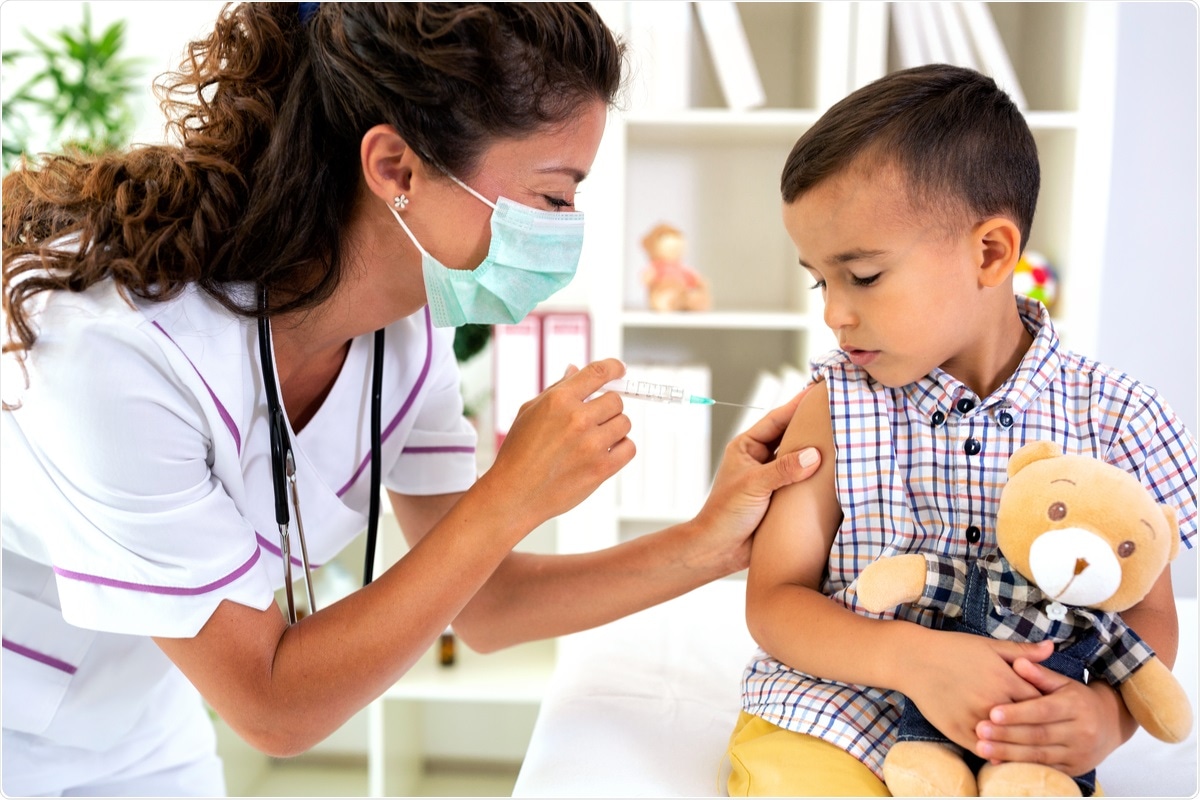In a new study under consideration at a Nature Portfolio Journal and published on the preprint server Research Square*, researchers investigated the efficacy of CoronaVac, a coronavirus disease 2019 (COVID-19) vaccine developed by Sinovac Biotech, in children aged three to five years.
The findings of this study reveal that a two-dose regimen of the vaccine is highly effective in preventing severe COVID-19, whereas this vaccine regimen is modestly effective in preventing infection.

Study: Effectiveness of CoronaVac in children 3 to 5 years during the omicron SARS-CoV-2 outbreak. Image Credit: didesign021 / Shutterstock.com

 This news article was a review of a preliminary scientific report that had not undergone peer-review at the time of publication. Since its initial publication, the scientific report has now been peer reviewed and accepted for publication in a Scientific Journal. Links to the preliminary and peer-reviewed reports are available in the Sources section at the bottom of this article. View Sources
This news article was a review of a preliminary scientific report that had not undergone peer-review at the time of publication. Since its initial publication, the scientific report has now been peer reviewed and accepted for publication in a Scientific Journal. Links to the preliminary and peer-reviewed reports are available in the Sources section at the bottom of this article. View Sources
Background
The COVID-19 pandemic caused by severe acute respiratory syndrome coronavirus 2 (SARS-CoV-2) has caused unprecedented damage to the global healthcare system, with more than 468 million infections and almost 6.1 million deaths reported worldwide. The greatest severity of COVID-19 has been observed among elderly people and those with comorbidities. In contrast, SARS-CoV-2 has mostly caused asymptomatic or mild infections in children.
The recent emergence of the SARS-CoV-2 Omicron variant has caused a significant resurgence of COVID-19 cases worldwide, as it is associated with high transmissibility and immune evasion ability. In addition to significantly increasing the cases of vaccine breakthrough infections, the Omicron variant has also increased the rate of infection and hospital admissions among children. Increased susceptibility of children to Omicron infection has emphasized the need for evaluating vaccine efficacy in children.
Study design
A total of 490,694 children were enrolled in the current study, all of whom received two doses of the CoronaVac at an interval of 28 days. Vaccine efficacy was evaluated against laboratory-confirmed COVID-19, hospitalization, and admission to the intensive care unit (ICU).
Moreover, vaccine efficacy was assessed using inverse probability-weighted survival regression models that estimate the hazard ratio of complete immunization over non-immunization. The study was conducted between December 2021 and February 2022, which is when the Omicron variant was predominantly circulating in Chile.
Study findings
During the Omicron outbreak, the CoronaVac showed 38% efficacy against SARS-CoV-2 infection in children aged three to five years. In terms of preventing COVID-19-related hospitalization and ICU admission, the vaccine was associated with 64% and 69% efficacy, respectively.
The vaccine efficacy observed in the current study is significantly lower than that observed in a previous study, which estimated CoronaVac effectiveness in children aged six to 16 years during the Delta outbreak. In that study, vaccine efficacy was estimated to be 74%, 91%, and 93% against SARS-CoV-2 infection, hospitalization, and ICU admission, respectively.
This difference in vaccine efficacy could be due to the higher immune evasion ability of the Omicron variant as compared to the Delta variant. Another reason could be inclusion of comparatively younger children in the current study group. In this context, studies have indicated that the age of children could potentially affect the vaccine effectiveness.
The scientists adjusted the study estimates for observable clinical, demographic, and socioeconomic confounders that may influence the vaccination process and risk of COVID-19. However, they could not adjust their findings for unobservable confounders, such as adherence to COVID-19 protocols by vaccinated and unvaccinated children and their caregivers. These factors might also impact the estimated vaccine efficacy.
Conclusions
The current study provides real-world estimates of the effectiveness of an inactivated virus COVID-19 vaccine in children aged three to five years. The vaccine shows modest efficacy in preventing SARS-CoV-2 infection; while appearing to be highly effective against severe COVID-19.
The current study was conducted during the Omicron outbreak in Chile, which is when vaccine rollout was rapid and uptake was high. Taken together, the real-world estimates provided here could complement those made in controlled clinical trials and provide valuable information to policymakers for risk/benefit analyses and decision making processes.

 This news article was a review of a preliminary scientific report that had not undergone peer-review at the time of publication. Since its initial publication, the scientific report has now been peer reviewed and accepted for publication in a Scientific Journal. Links to the preliminary and peer-reviewed reports are available in the Sources section at the bottom of this article. View Sources
This news article was a review of a preliminary scientific report that had not undergone peer-review at the time of publication. Since its initial publication, the scientific report has now been peer reviewed and accepted for publication in a Scientific Journal. Links to the preliminary and peer-reviewed reports are available in the Sources section at the bottom of this article. View Sources
Journal references:
- Preliminary scientific report.
Araos, R., Jara, A., Undurraga, E., et al (2022). Effectiveness of CoronaVac in children 3 to 5 years during the omicron SARS-CoV-2 outbreak. Research Square. doi:10.21203/rs.3.rs-1440357/v1. https://www.researchsquare.com/article/rs-1440357/v1
- Peer reviewed and published scientific report.
Jara, Alejandro, Eduardo A. Undurraga, José R. Zubizarreta, Cecilia González, Johanna Acevedo, Alejandra Pizarro, Verónica Vergara, et al. 2022. “Effectiveness of CoronaVac in Children 3–5 Years of Age during the SARS-CoV-2 Omicron Outbreak in Chile.” Nature Medicine 28 (7): 1377–80. https://doi.org/10.1038/s41591-022-01874-4. https://www.nature.com/articles/s41591-022-01874-4.